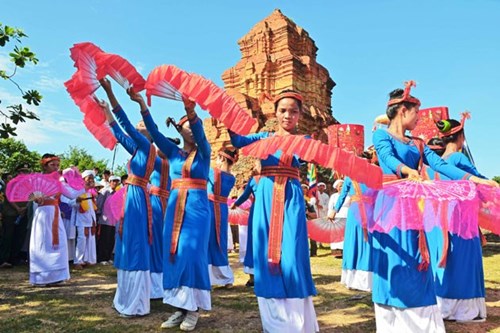
The ethnic Cham Brahman people will hold the Kate festival, their most important event in the year, in the central province of Ninh Thuan from October 19-21.

Cham people in Ninh Thuan celebrate Kate festival
Major activities will take place in temples, towers and central
areas in villages and towns on October 19 morning.
Vice Chairman of the
provincial People’s Committee Le Van Binh said a ceremony to receive a
certificate recognizing the Kate festival as a national tangible heritage will
also be held in Po Klong Garai and Po Rome towers and Po Inungar shrine on October
19 morning.
Director of the
provincial Department of Culture, Sports and Tourism Chau Thanh Hai said
visitors to the event could witness rituals such as a costume procession, the
opening of tower gates, genie statue bathing as well as enjoy Gi Nang drum and
Saranai horn sounds.
Falling on the first day
of the seventh month of the Cham calendar, Kate is the most popular Cham
festival in Ninh Thuan. It reminds the ethnic Brahman community of their
ancient gods and delivers wishes for bumper harvests and the growth of all
beings.
The Cham people have
several distinctive festivals including the Ramuwan, the Rija Nugar, and the
Chabun.
There are about 153,000
Cham people in Vietnam, including approximately 72,500 people in Ninh Thuan.
Over 43,000 of them, scattered across 12 communes in seven districts, follow
the Brahmin religion.
Source:
PANO
As a land deeply intertwined with human history and Vietnam’s millennia-long journey of nation-building and defence, Hoa Binh is often revered for its epic tales and legends.
Residents of Hoa Binh boast a rich cultural identity, reflected in their unique language, traditional attire, customs, and folk melodies – described as "sweet as honey, clear as a mountain stream.”
Lac Son district’s Vu ban town held the 2025 Truong Kha temple festival on April 12–13 (the 15th–16th days of the third lunar month). Since its revival in 2019, the festival has been organised every three years, preserving valuable intangible heritage while meeting the community’s cultural and spiritual needs.
The clothing of women reflects the culture of the Muong, Thai, Tay, Dao, and Mong ethnic groups in the northern province of Hoa Binh.
Gongs hold a special place in the cultural and spiritual life of the Muong ethnic people in Hoa Binh province. More than musical instruments, they are an indispensable part of community rituals and collective memory, echoing through generations as a spiritual thread linking the past, present, and future.
Preserving and promoting the cultural values of the Muong ethnic group has become an urgent task in the current context, as many traditional values face the risk of fading away. This effort requires not only protecting the cultural identity but also eliminating outdated customs and developing a modern cultural lifestyle, contributing to sustainable values for the Muong community in Hoa Binh province.
The Muong ethnic culture, deeply rooted in Vietnam’s mountainous north, continues to be preserved and revitalised by dedicated individuals and communities determined to safeguard their ancestral identity.



